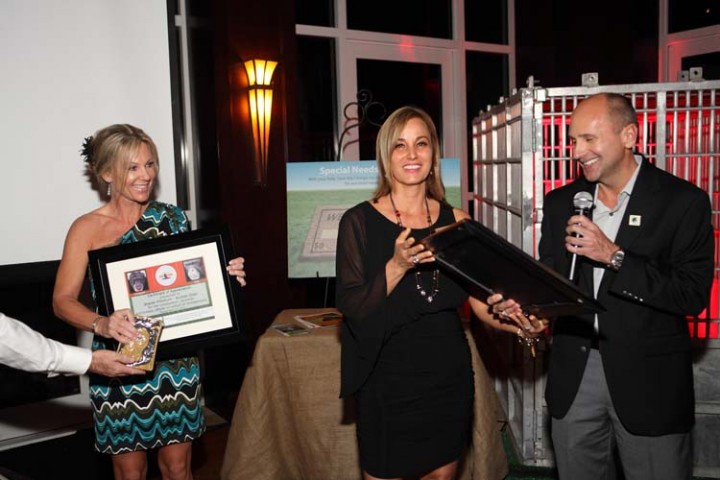
FORT PIERCE — Cheetah, a 35-year-old chimpanzee, is one of the resident artists at Save the Chimps, the world’s largest chimpanzee sanctuary located in Fort Pierce, Florida.
He can often be found creating colorful and expressive paintings that spill off the canvas and onto the walls and floors of his home. He has come a long way from the dismal and oppressive conditions at the Laboratory for Experimental Medicine and Surgery in Primates (LEMSIP) where he used to live.
Because of the invasive biomedical research Cheetah endured at LEMSIP, he is one of a dozen “special needs” chimpanzees at Save the Chimps sanctuary.
The majority of the 269 chimpanzees at Save the Chimps roam throughout twelve 3.5-acre “islands in the sun” that consist of trees, hills, climbing structures, and a hurricane proof building for shelter.
However, these special needs chimpanzees have suffered physical or emotional damage so severe that it makes it impossible for them to live in a large family group on one of the islands.
To accommodate Cheetah and the other chimpanzees with special needs, Save the Chimps is converting an existing building into a special needs facility with connecting outdoor enclosures that will house these traumatized animals and others with severe medical conditions.
Save the Chimps will be raising funds for this endeavor during its fourth annual Chimps Kitchen: A Celebrity Chef Food Tasting event on Thursday, November 8, from 6-9 p.m. at Cobalt at the Vero Beach Hotel and Spa.
“Our goal is to build new hope, and a new home, for our neediest chimps who have spent fearful years in cold, sterile labs and isolation,” said Triana Romero, Director of Communication for Save the Chimps.
“The special needs facility will help them thrive. They have outdoor enclosures with climbing structures and swings, the warm sun on their backs, and grass beneath their feet. But we couldn’t do it without the support from the community and funds raised from the Chimps Kitchen event.”
The eclectic event will feature a selection of delicious vegetarian hors d’oeuvres created by local celebrity chefs including:
Cobalt – Chef Micheal Van Buskirk
Culinary Capers – Chef Dan Graham
Riverside Café – Chef Samuel Beers
Frosting – Pastry Chefs Ashlee & Ryan Wykoff
Costa d’Este – Chef Antonio Estremers
Windsor – Executive Chef Stephane Becht & Head Chef Brian Jones
And more.
The event also features a specialty drink with a Save the Chimps flare: banana daiquiris sponsored by Cruzan rum.
Exciting silent auction items will be available for purchase, including original paintings created by Cheetah and other chimpanzee residents.
Cobalt at the Vero Beach Hotel & Spa, where the event will be held on Nov. 8 from 6-9 p.m., is located at 3500 Ocean Dr., Vero Beach, FL 32963.
Tickets are $75 and can be purchased by contacting Save the Chimps at (772) 429-2225 or Events@SaveTheChimps.org.
Proceeds from Chimps Kitchen Event on Nov. 8 will be used to help chimps with severe medical conditions and extreme trauma.
To learn more about Save the Chimps, please visit the website at www.SaveTheChimps.org/ChimpsKitchen
About Save the Chimps
Save the Chimps is a non-profit organization dedicated to providing permanent sanctuary for the lifelong care of more than 250 chimpanzees rescued from research laboratories, the entertainment industry, and the pet trade.
About the Great Chimpanzee Migration
The Great Chimpanzee Migration began in 2002 when The Coulston Foundation (TCF), a biomedical research laboratory in New Mexico that was on the verge of bankruptcy, contacted Save the Chimps founder, Dr. Carol Noon, and offered to sell the laboratory land and buildings to Save the Chimps and “donate” its 266 chimpanzees.
Thanks to a $3.7 million grant from the Arcus foundation, Save the Chimps was able to purchase and modify the stark TCF facility into a healthier and happier environment for the chimpanzees, including, for the first time in their lives, fresh food, enlarged cages, enrichment activities, compassionate caregivers and, most importantly, the establishment of social groups.
In 2011, Save the Chimps completed the migration by permanently relocating all of the former Coulston lab chimpanzees to their “Islands in the Sun” in Florida.
Save the Chimps’ custom-built trailer made more than twenty-five 4,000 mile round trips between New Mexico and Florida (the equivalent to driving around the Earth four times), carrying 10 chimpanzees each time.
When they arrived at their 150-acre sanctuary in Fort Pierce, chimpanzees were free to explore the islands of grass, palm trees, hills, and climbing structures that allow the chimps to run and roam, visit with friends or find a quiet corner to relax, bask in the sun, or curl up in the shade.
The islands give the chimps choices and control over their own lives, choices that were lacking during their years of confinement in small cages.



